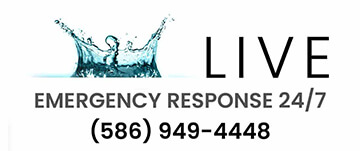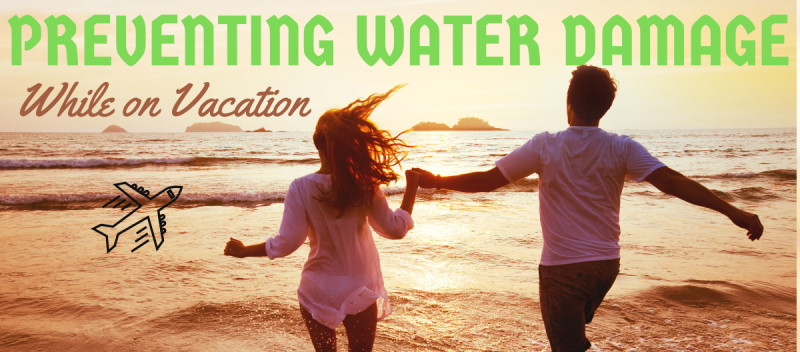How To Protect Your Home From Water Damage While On Vacation
Vacation Without Fear Of Water Damage
Many of the calls from frantic homeowners we get are from people returning home from vacation to find their homes in varying states of disarray due to unexpected water damage. You may be wondering how to protect your home from water damage while on vacation. The easiest solution to this problem is to employ a home sitter. Having someone in the home while you’re gone is the quickest way to avoid massive water losses while you are away.
What happens when even this isn’t enough? What can you do as a homeowner to insure your property is safe while out of town from the 3 different types of water damage? Let us review a few different tips and tricks you can employ to ensure your return home is quiet and relaxing and, most importantly, dry.
Check Your Supply Lines
Any appliance you own that is water fed, like sinks, toilets and refrigerators will often times come with cheap plastic supply lines. An inexpensive switch to steel braided stainless-steel supply lines will lower the risk of line failure and leave you with a sense of security when out of the house. The vinyl supply lines are much less substantial in materials which makes them easily break, crack and develop small leaks.
Often when refrigerators leak from faulty water lines the leak goes undetected till damages begin. Ceramic tile and hard wood flooring can become permanently damaged and result in a new floor being necessary.
Home Sitters
As we covered in the opening segment, having someone check on or stay in your home while you’re away is the easiest and best was to ensure that any water loss is caught quickly and treated immediately. While someone being in your home may not prevent water losses, time in a water loss is your worst enemy and getting to water damage issues quickly is incredibly important when it comes to the health and safety of your home.
Although regular checking on the home is the best way how to protect your home from water damage while on vacation, it is important the chosen individual be instructed correctly. If they just open the door, stick their head in and conclude all is well because the place hasn’t been ransacked, multiple potential dangers could still exist.
They should be instructed to make sure the electricity is working, the indoor temperature is the same as the setting on the thermostat and the basement needs to be checked for flooding. This is important as flooding can occur just as someone is vacating the home and unless the property is inspected daily, water damage can devastate if left for over 24 hours.
Test Your Sump Pump
Basement backups are never fun and often times incredibly expensive without insurance. It is important that your sump pump is working properly at all times but especially when you are away from your home. To test your sump pump, simply fill a 5 gallon bucket with water a pour that water into the sump well. This should engage your sump pump and your sump pump should pump all of that water out.
It is also important to check the surroundings of your pump, as well as your float mechanics. A stuck float mechanic can cause the sump pump to run constantly, eventually burning out the pump and causing a failure. Alternatively, sump pump float can sometimes become stuck and never engage the pump at all, regardless of water level. Either of these scenarios can be devastating and allow a basement to flood in a vacant home.
If you have a water backup system attached to your sump pump it will be important to also check the float system and ensure the water back up is operating properly by engaging the float and confirming the pump is working. Battery backup systems should also be tested to make sure the battery is charged and ready for service in the event of a power outage while you’re away.
Making sure that your sump pump is in tip top condition can help to prevent a costly sump pump backup in your basement. Some home surveillance companies may also offer water damage sensors and alerts that can be helpful. If you have someone staying in your home while you are away, the most effective tool in preventing sump pump backups in our experience has been water alarms.
These tools will act like smoke detectors for your sump pump, alerting you quickly to any sump pump failures and giving you ample time to call a plumbing professional or fix the pump yourself saving you thousands. Of course, this system will only be effective if someone is watching your home for you.
Turning Off The Water – Best Tip How To Protect Your Home From Water Damage While On Vacation
The best way to protect your home from freshwater flood losses while you are on vacation is to turn off the main water line to your home. By turning off the water main, you have taking a great step toward protecting your home from unexpected water damage especially during the winter months.
In the event of a furnace failure and your home temperatures dropping below freezing, by turning off your water main and draining any water in the system you have made sure that any water in left in the lines will not be enough to freeze the line and burst the pipe.
Pipes burst when water inside the line is frozen and expands beyond the limits of what your copper lines can stretch. This creates a blister in the line allowing for water to pour into your home wreaking havoc and mayhem. Your water main will almost always be located in your basement or in your crawl space. There should be two valves with which you can shut down the water supply to your home.
Check to see if the water is off by turning on both the hot and cold handles on any sink in your home. To drain the lines, open sinks at the lowest point in your home and remember to flush all toilets. If you’re not able to turn off the water main, going faucet to faucet in your home and turning off all supply lines is another way to prevent water damage from a supply line failure, though it will not prevent burst pipes elsewhere in your home.
Do An Outside Evaluation
Downspouts and gutters can cause their own issues inside your home as well as outside. Make sure all gutters and downspouts are clear of debris and leaks before you depart. Downspouts that feed into uneven landscaping can cause puddling around the foundation of your home, inviting water to chip away at the concrete foundation of your basement.
Loose shingles are havens for pooling water waiting to freeze and lift the plywood sheets that make up your roof leaving gaps large enough to cause leaks from above. Gutters full of leaves will also become a pool for water to collect and work it’s way under your shingles. Make sure that all of your downspouts are diverting water far enough away from your home (roughly 10 feet.)
Keep Your HVAC Running
It may be tempting to turn off your furnace or central air in the event that you won’t be home for a few weeks. No sense in keeping a home comfortable when no one is there, right? While the getting a small utility bill for the time you are gone may seem like an ideal situation, often times extreme weather can cause major damage in your home without ever seeing a flood. Your home central air system will act as a dehumidifier in the summer months and keep your home above freezing in the winter.
Keeping your air conditioning on and running may help to prevent the relative humidity inside your home from rising to dangerous levels causing condensation and minor water damage, as well as nail pops and warped wood floor coverings. Turning the air up to keep bills down is a great idea while you’re gone but resist the temptation to turn your central air off completely. As well as your air conditioning, you should also resist the temptation of running any appliances right as you are leaving your home.
It may seem an innocent task to allow a cycle of dishes to run in the dishwasher, or even to run your wash just before your leave to run errands, but these appliances rarely create problems while they are not in use. Failures in dishwashers and clothes washing machines can be catastrophic and would only be exaggerated in intensity if the home is vacant when the malfunction occurs.
Because all water deluges to the basement below the damages could be devastating and you may come home to have to cleanup a flooded basement.
Check Your Home Before You Go
The last and possibly most important thing you can do to prevent water damage in your home when you are gone on vacation is to check your home to potential problems. It is important to check all water connections for potential issues. Make sure your cabinets and vanities have to sign of water damage and your metal lines are free from rust. Check all waste lines by laying a clean, dry paper towel below the P-trap and running warm water through the system for at least 30 seconds. Check refrigerator lines for pin hole leaks.
Do an overall home wellness check to be sure that there are no water issues in your home beginning to show themselves before you leave you home. Check the base of your furnace and hot water tanks so make sure there are no leaks or water stains around the base of both appliances. If you’re leaving in the winter be sure to check any doors and windows for drafts water staining as these may lead to larger problems while you’re away.
If your property has the luxury of a sprinkler system and your vacation is just after winter, you may want to test the system before you leave for leaks and pooling water. If the cold months caused any freezing, your outside sprinklers could be leaking close to the basement walls and tending to any issue before you go, could save you from water damage from a sprinkler system.
Protect Your Home From Water Damage While Vacationing
When it comes to how to protect your home from water damage while you’re on vacation, I hope these tips and tricks will give you the tools to make sure your next vacation is stress free and your home is thoroughly protected from unexpected water damage. In the unfortunate event of a water damage incident while you are away I hope you’ll consider Action Extraction for any of your water damage needs!




